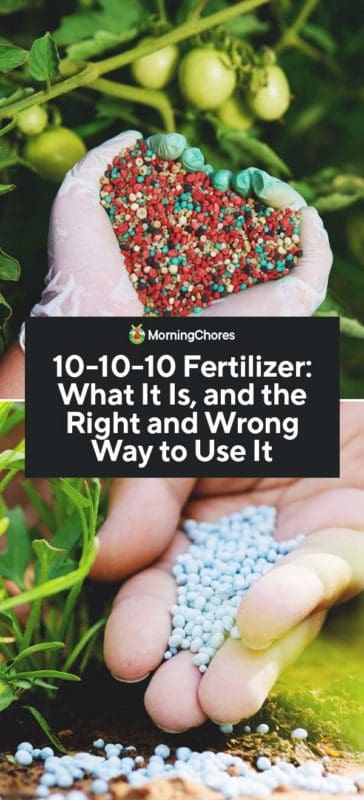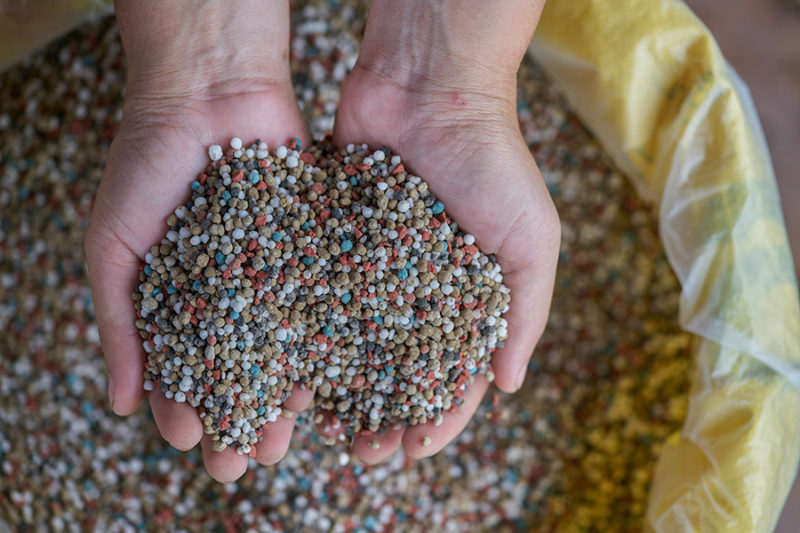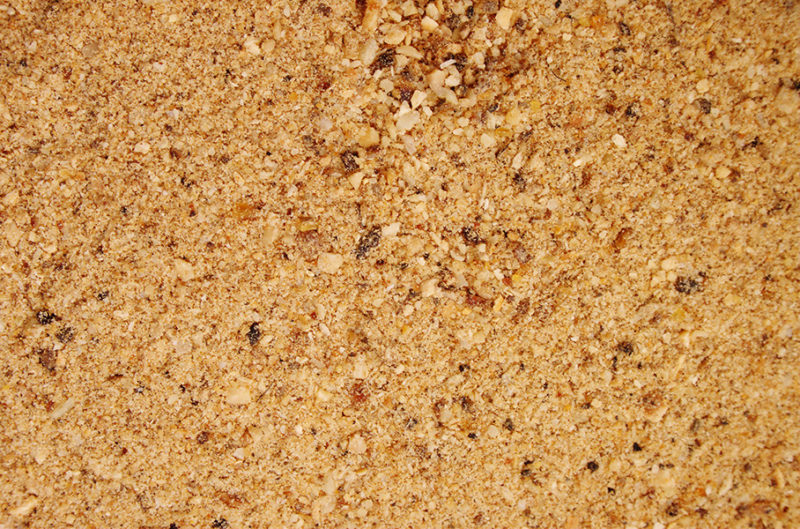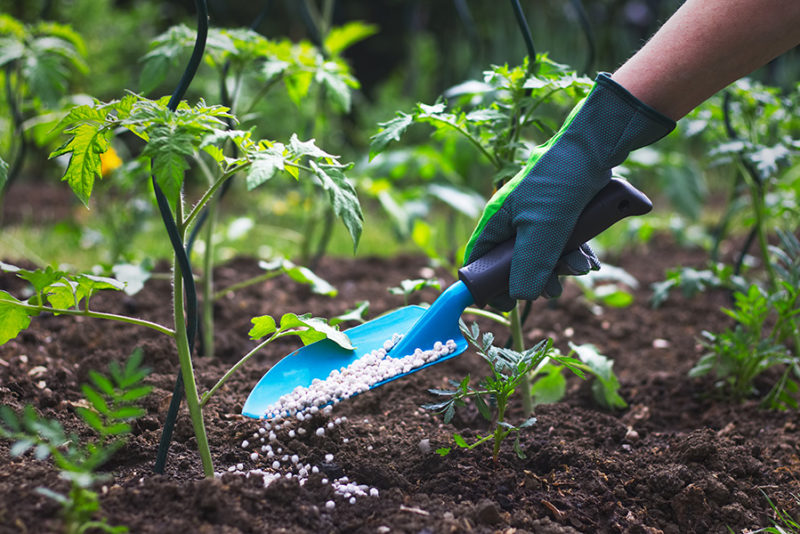When Should I Use 10-10-10 Fertilizer On My Garden
Fertilizers come in such a huge variety of mixtures and different ingredients that it can be hard to narrow down which one you need. 10-10-10 is a common and popular formula you've probably seen on store shelves a million times, but what is it and what is it good for?
The numbers 10-10-10 represent the amounts of nitrogen, phosphorus, and potassium – or as they are commonly known, NPK – in the formula. That means there's 10% of each one of these elements. NPK are considered the primary nutrients that every plant needs to survive.
10-10-10 is considered an all-purpose, balanced fertilizer that you can use for all kinds of plants and situations. In this article, we'll discuss what it is, when to use it, and why you might want to put it back on the shelf.

What is 10-10-10 Fertilizer?

10-10-10 fertilizer is considered a complete fertilizer because it mainly consists of the primary nutrients. Some formulas will have added iron or calcium to target certain plants.
There is no one definition of what 10-10-10 fertilizer is because each company may have different ingredients. They all contain 10% of each element, but other than that, they can vary. The more common ingredients are ammonium hydroxide, urea, ammonium nitrate, phosphoric acid, and potassium hydroxide.
These ingredients are made to dissolve quickly so they're readily available to plants. This also means that they may be lost due to erosion or decay. When you look at application rates for this fertilizer, they usually recommend frequent applications because it can disappear so quickly.
10-10-10 is considered an inorganic or synthetic fertilizer. That means it is man-made with minerals or synthetic chemicals.
Advantages of 10-10-10 Fertilizer
The biggest advantage is that it's easy to use. You don't have to think about what nutrients your plants need. You just sprinkle the 10-10-10 around them. It's also readily available to plants and breaks down quickly.
Disadvantages of 10-10-10 Fertilizer
Advertisers will tell you that you can't go wrong with an all-purpose fertilizer, but they aren't all they're cracked up to be.
One disadvantage of any inorganic fertilizer is they may crust on top of the soil rather than soaking deep into the roots. Also, they don't enrich the soil long-term, but provide a quick fix of nutrients. Here are some other issues associated with 10-10-10 fertilizer.
Excessive Nutrients
When using this type of fertilizer, you run the risk of giving your plants excessive amounts of nitrogen. This may increase leaf production but diminish fruiting. You'll often see this with tomatoes. Too much nitrogen can also encourage fast, spindly growth, causing the plant to be vulnerable to disease.
You also run the risk of adding excess phosphorus, which can increase your risk of chlorosis. Phosphorus can also kill the symbiotic mycorrhizal-forming fungi that live in the soil. When microorganisms in the soil die, it causes an inability for the plant to absorb iron and other micronutrients. It can shut down the plant's production of phytochelatins. These organic molecules help regulate iron intake and other important nutrients.
Adding nutrients when they're not needed can cause deficiencies, and an imbalance in nutrients and the plant's ability to absorb them.
Dangerous Chemicals
Natural fertilizers don't contain caustic chemicals, but 10-10-10 fertilizers do – as you can tell from the warning labels on the bag. Some of the chemicals used in complete fertilizers are harmful to our health. When you're applying fertilizer, protective clothing is recommended. They also shouldn't be used around children.
They may also contain heavy toxic metals that can damage our health. I'm sure you have seen the lawn signs that say "stay of the grass" because dangerous chemicals have been applied there. Personally, I choose not to place things that are corrosive and can harm my family, pets, and lawn equipment where I am growing my food.
Nitrogen Runoff
10-10-10 fertilizer contains a lot of nitrogen – 10%, of course. This nitrogen can erode during spring rains and pollute your streams and ponds. On many bags of fertilizer, you'll see a warning that states it's toxic to fish and invertebrates. That can mean that you're killing your earthworms and other microbial life. For any organic farmer, that's counterproductive.
I live in Kentucky and agricultural runoff from my state pollutes the Gulf of Mexico. Our excess nitrates travel via waterways down to the Ohio River to the Mississippi River and into the Gulf of Mexico.
In the gulf, excessive nitrogen causes algae blooms. This has had a detrimental impact on the fishing and crabbing industries in the Gulf shore states.
Salt
Inorganic formulas also contain a lot of salt as part of their chemical makeup. These salts can build up in your soil. Fertilizer salts aren't the same as the ones we sprinkle on our French fries.
Salts found in complete fertilizer mixes are basically an inorganic mineral that can be dissolved in water. Some examples are ammonium nitrate, calcium chloride, and potassium sulfate.
What's the problem with these salts? After all, some of them are mined from the earth. Proponents of inorganic fertilizers will tell you that this makes them natural.
What actually happens is that the plant doesn't need an abundance of salts. When the salt isn't absorbed by the plant, it sits in the soil. This salt builds up in the soil and can eventually clog the roots of your plants. During dry weather, the salts don't leach away and can burn or damage roots and plant stems. The result? You end up with a dead plant.
Alternatives
In contrast to synthetic fertilizers, organic fertilizers come from natural sources such as manure, compost, blood meal, green sand or bone meal.
The downside is that organic fertilizers have lower concentrations of nutrients. However, they build up the soil and provide nutrients for microorganisms. These soil microbes work in tangent with your plants, helping them absorb nutrients and fight disease.
It's interesting that to be labeled a fertilizer, government regulations only look at N, P, and K levels. Holistic gardeners realize that there are actually about 70 nutrients that plants need to be healthy.
This means that several materials we think of as organic fertilizers are labeled as supplements instead. Compost and kelp are two examples, even though both of these can improve the health of your soil and plants.

Instead of 10-10-10 fertilizer, consider using one or a mix of the following:
- Bone meal
- Cottonseed meal
- Alfalfa pellets
- Bat guano
- Fish emulsion
- Composted manure
Use this handy Fertilizer Calculator to figure out how much of each material you need.
If you don't want to go to the trouble of figuring out an alternative, you can find good 5-5-5 fertilizers that are all-natural and organic. Just double up on your dose.
Soil Testing
First of all, before you make ANY fertilizer decisions you should know what you are dealing with. Take a soil test. Having a complete soil test will tell you what your soil does and doesn't have.
Maybe for the past two years, you have been spreading wood ashes in your garden. When you do your soil test, you learn that you have a high level of potash, which ashes are rich in. This year, maybe you want to cut back.
That same test tells you that you are low in phosphorus. A 10-10-10 fertilizer isn't going to meet your needs because it will give you too much nitrogen and potassium. A fertilizer higher in phosphorus such as bat guano may be up your alley.
Choosing Fertilizers Based On Plant Needs
Different plants have different needs, and to complicate that a bit, plants have varying needs during the growing season.
For example, let's look at tomato plants. When they're young, a dose of nitrogen or a "complete" fertilizer may be a good thing because the plants are growing and making leaves.
When the tomato starts to set fruit, it needs less nitrogen and more phosphorus. Now, a 10-10-10 fertilizer is inappropriate. At that point, tomatoes need calcium and magnesium to support fruit development. These vital secondary nutrients are not commonly found in an all-purpose fertilizer mix.
Carrots are another good example. They need a higher level of potash and a lower level of nitrogen than most crops, so a 10-10-10 fertilizer won't meet all its needs. Studies have shown that carrots love a dose of kelp and benefit from its micronutrients.
These examples aren't to make gardening seem hard or complicated. Just be aware of some of the differences in how your plants grow so you can provide them with what they need. Of course, your crops will probably be fine with an all-purpose fertilizer, but be aware that it's not always the right solution.
Ornamentals, Trees and 10-10-10 Fertilizer
You'll often hear that perennials such as fruit trees, berry bushes, and ornamental specimens should receive a dose of 10-10-10 fertilizer in the early spring. Even in established soils, the logic is that they can always use a boost.
However, keep in mind that before you start tossing on the fertilizer, you need to consider what you did in fall. Did you spread compost around your trees and add a bunch of mulch? If you did, it will be feeding the soil slowly once the weather warms up, so you may not need a dose of fertilizer.
Keep Safety in Mind

If you choose to use chemical fertilizers, take precautions to protect yourself. Dress in long pants and long sleeves and wear protective gloves, eye protection, and a breathing mask.
Don't let your pets or kids walk on fertilized plants, and be sure to follow the manufacturer's directions to the letter.
The Bottom Line on 10-10-10 Fertilizer
I hope that what you take away from this article is that you should carefully consider what type of fertilizers you apply to your garden.
It's probably clear to you that I am an advocate for organic agriculture. I want to live a lifestyle that is supportive and healthy for the environment. I want my farm, my animals and my family to benefit from good health.
In doing so, I consider the needs of my garden plants and look at the short and long term solutions to building healthy soil. 10-10-10 fertilizer has its place, but it isn't the catch-all that it is painted as. Use it wisely and know when to reach for something else.
Was this article helpful?
Yes No
When Should I Use 10-10-10 Fertilizer On My Garden
Source: https://morningchores.com/10-10-10-fertilizer/
Posted by: dotyandre1985.blogspot.com

0 Response to "When Should I Use 10-10-10 Fertilizer On My Garden"
Post a Comment